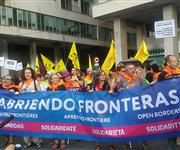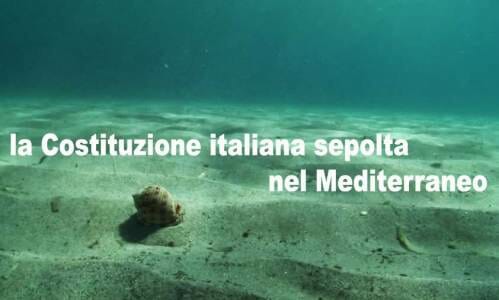Don’t Worry Dad, I’ll Die Happy Because You’re Alive At Least
I cannot but feel pain when confronted by the death of an innocent, and the thought that someone you love might lose their life in such an unjust way sends a long, cold shiver down your spine. The news that a father had to leave his small daughter dead at sea so as to try and save other lives during yet another maritime massacre, the harvest of murderous European policies, has disturbed me deeply. What can we possibly do to help a desperate father who has lost both wife and child?
The five bodies arrive at the port of Trapani. Photo: Giorgia Mirto
The reply to this question doesn’t interest us. We reject, we raise up walls which kill – above all the most vulnerable, women and children. We are aware of all this, the data provided by international organisations is quite clear: the deaths are increasing along with the violence and exploitation.
We accepted yet more bodies last week at Trapani, because we are very good at welcoming the dead, even if we are less able to support and provide opportunities to the survivors. Five bodies, including two Syrian children. But the body of a young girl was missing, who died in her father’s arms, a man who then chose to rescue his other child and many other children. A man who, like so many others, will always live with this horrendous memory. A father who became the saviour of the latest shipwreck which, as is always the case, came to pass in the total media indifference.
These are, by now, daily situations, as normal as the illegitimate practices enacted by institutional agents, from the Prefecture to the city council and the police station. Illegitimate practices which bring hardship to the migrants themselves, for whom nothing remains but to protest. There are now daily protests, such as that which, for two days last week, saw the migrants at Piano Torre in Isnello (province of Palermo) take centre stage. A surreal protest, to tell the truth, because the migrants housed in the centre, lost way up in the Madonia mountains, organised a road block in a road which provides passage only to those who work at the centre and a few wild boar and horses.
The residents are protesting because their pocket money is not paid regularly, a delay related to the economic difficulties of the managing body, which has itself not been paid for almost a year by the Prefecture, due to problems relating to the change of management. In the end, however, it is the young men housed there who suffer, deprived of all contact and subjected to huge bureaucratic delays, and are losing all hope. It cannot be acceptable to wait 5 months in order to fill out the C3 form, or indeed to wait the same length of time to receive a decision from the Territorial Commission.
The most pressing problem is the centre’s isolation. And if this idea could be acceptable for an emergency camp (CAS*) – within the bounds of an already failed reception system – it is worse still for a SPRAR* centre, for which insertion into social and working life would need to be a central part of the project. The same problems are found in the famous specialised centres for minors, to which migrants are literally parked until they turn 18, despite the fact that the period of their stay there is not officially meant to surpass three months.
The lack of serious and systematic planning in the organisation of reception creates these unacceptable situations of indecency, prejudice and exploitation which require a sudden change of gear for the sake of justice. And the lack of any planning in Trapani – in the only Sicilian Hotspot where, up until yesterday, there had been a relative balance between the necessities of security and humanitarianism – has created a range of difficulties. The disembarking of 800 people some days ago has forced a strained system to breaking point: for the first time, 200 people were transferred to Messina without having been identified; 90 Moroccans were given a floor to sleep on within the complex’s sitting room, and after a few days were thrown out at night with a deferred rejection notice in hand. They were taken to the gates in small groups in the dead of night, so as not to attract attention, without any information and with the false conviction that Palermo could be easily reached on foot. These situations have taken place at the same time as a changing of the guards in the higher echelons of the Prefecture, situations which never happened under the former Prefect, Falco. Is this a new course of action? From the accounts of those rejected, it seems that they weren’t even given the chance to take a shower. Beyond this, within the Hotspot itself, the many men, women and children live all together, without any appropriate separation. Further news relating to the Trapani Hotspot is that of the 10 Egyptians who will have been deported on a plane which left via Catania, and the two Tunisians transferred to the detention centre (CIE*) in Caltanisetta.
Another difficulty in the reception system is to be found in the application process for the relocation programme, inasmuch as Villa Sikania (in the province of Agrigrento) – the only regional Hub which, due to the overcrowding and the nature of the migrants hosted there, functions as a CAS* – is full. This is also due to the disembarking of 300 people at Porto Empedocle, who were initially destined for Pozzallo but, due to the lack of places, were then redirected to the Agrigentan port. The ever longer waiting times for relocation, currently around a year, reaffirm that this is not a method adequate for the situation at hand. And since those who are in the relocation programme are no longer transferred to the Hub in Rome designed to make space at Villa Sikania, they have instead been relocated to the CARA* at Mineo (which is also turning into a Hotspot by necessity), a centre which has once again been confirmed as multifunctional and adaptable for every eventuality, despite the ongoing court investigations.
At the Trapani cemetery, during the brief funeral for the 5 victims who died at sea. Photo: Giorgia Mirto
Difficulty, death and exploitation are the word of the day which resound often, and far too often are the consequence of a political criminal impunity. I try to find consolation by imaging that little ‘B’ could offer up these words in a dream to her poor father, if only to give some sense to a life to be forever shattered with pain: “Dad, I know how hard you fought to save me from death, but you did not manage it, first you had the courage to carry us away from the bombs, then you fought off the trafficker’s violence, but against the sea, the ferocious ally of the poor Western world, you could not manage to save my small life and that of my Mum, but we are happy because you saved the lives of so many, starting with my brother; Dad, be strong, keep fighting against this racist politics, because it’s them who killed us, we’re happy for you, Mum sends you a kiss.”
Alberto Biondo
Borderline Sicilia
Project “OpenEurope” – Oxfam Italia, Diaconia Valdese, Borderline Sicilia Onlus
*CARA – Centro di accoglienza per richiedenti asilo (Reception centre for asylum seekers)
*CAS – Centri di Accoglienza Straordinaria (Extraordinary Reception Centres)
*CIE – Centro di identificazione ed espulsione (Centre for Identifiction and Deportation)
*SPRAR – Sistema di protezione per richiedenti asilo e rifugiati (System for the protection of asylum seekers and refugees)
Translation: Richard Braude




